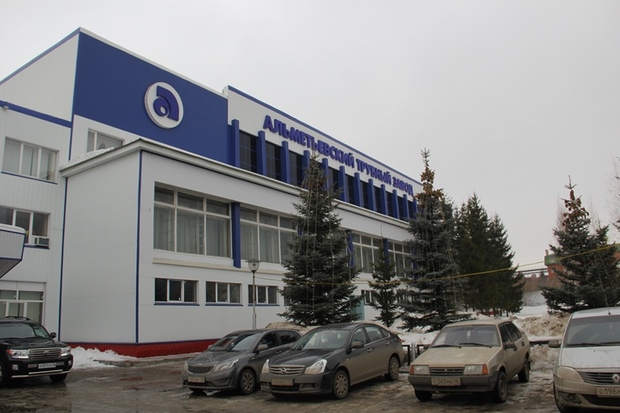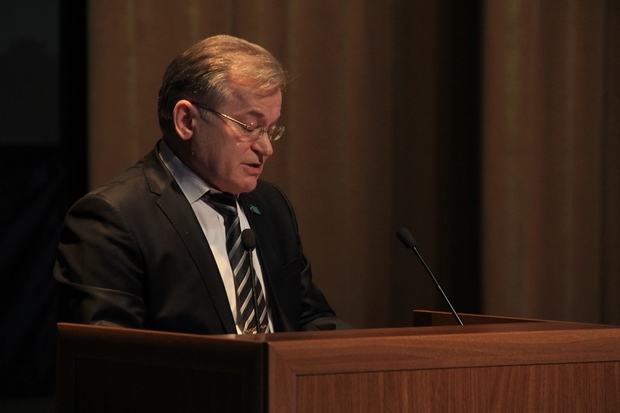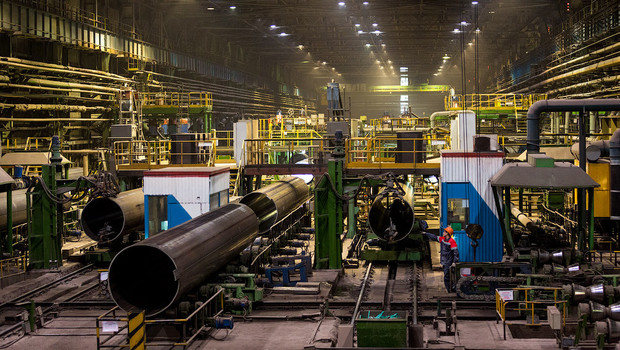Shantsev lures a 3,5bn rubles project away from Almetyevsk
Transfer of a pipe project for Tatneft ‘presented’ Tatarstan $10m of lost profit, which turned into $170m for Almetyevsk Pipe Plant
A mega scandal erupted in petroleum capital of Tatarstan – and was not noticed by journalists. As Realnoe Vremya found out, Almetyevsk Pipe Plant (which is included in United Metallurgical Company (OMC)) closed up a promising project on production of large diameter casing pipes for Tatneft and Bashneft. Due to a sharp rise of currency rates, OMC had to transfer its liquid production of Vyksa Metallurgical Plant to Nizhny Novgorod. Lost profit of the enterprise is estimated at $170m and loss of the budget – at up to $10m. Realnoe Vremya goes into details.
Stake at large diameter
The managing director of Almetyevsk Pipe Plant (APP) Aleksander Tokarev explained the reason for the failure of the project on 18 February, when a summary report of Almetyevsk Municipal District was presented. In 2015, one of the largest producers of steel electric resistance welded pipes of small and medium diameter (from 17 to 219 mm) APP was going to open a new direction – so-called 140-426 mm diameter finishing casing pipes. It was supposed to deliver pipe billets to APP from Vyksa Metallurgical Plant, which is also a part of OMC, for finishing. In Almetyevsk, it was planned to cut a thread and wind coupling sleeves on pipes. So, an ordinary pipe became casing pipe. And mainly petroleum companies of Western Siberia were to become major consumers. Estimated capacity of production is up to 150,000 tonnes.
In case of successful launch, APP could increase its revenue twofold and profit fivefold. It would be good both for the regional and municipal budgets.

'In 2014, an investment project on production of casing pipes at 3,5bn rubles was opened. According to the contract with a Japanese company on delivery of special equipment, they had a prepayment equal to €8,5m. A place for production and supporting equipment (bridge crane) were prepared. The project was to offer new 250 working places,' Aleksander Tokarev started to tell.
'However, after a sharp rise in dollar and euro rates, the price of the project increased more than twofold, and payback period rose from 4,5 to 10 years,' Tokarev explained. 'Plus, banks raised their interest rates. In this conditions, financing of this project would be impossible. As a result, the administration of OMC decided to stop the project in APP and transfer it to a site of Vyksa Metallurgic Plant in Nizhny Novgorod Oblast.'
A source, which is aware of the situation, informed that it was a difficult decision for the company: APP has a high production culture, and OMC was going to develop the enterprise by means of construction of finishing centre. But the closeness of the finishing centre to the pipe producer was one of the decisive factors in economical terms.
Metallurgists-destroyers
Due to a difficult financial situation in December 2015, there was an agreement on suspension of the contract for 9 months with the company that delivered the equipment (Nakata, Japan). OMC compensated the Japanese party the expenses because of the long term of the storage of the equipment.
'What is more, Japanese equipment was ready to use. We had to pay money for the suspension from 5 to 8 million rubles monthly. We were up the creek!' he sighed ruefully.
Peculiar hara-kiri happened against a background of simultaneous galloping price growth for metals and falling demand for pipes.

'The metallurgists started the 2015 with wild growth for metal,' Tokarev said. 'Prices increased almost by 40% during the first three months. And price for metal in Russia was $5-9,000 more expensive than the exported because world price for metal was falling at that time. These are paradoxes in the economy,' he made a helpless gesture.
'Metallurgists simply destroyed the domestic market with their pricing policy. Prices suddenly rose in the first quarter then started to fall in the second, rose in the third and sharply dropped in the fourth quarter. As a result, price for metal increased by 25% on average,' he reminded. 'It created a panic in the market. So, enterprises suddenly reduced procurements and tried not to create stock reserves. But plants don't have this opportunity, we are very inertial. Monthly change of the price doesn't allows us to forecast the situation even one month in advance. Consumers just did not understand the principle of pricing formation.'
Shantsev attracted with concessions
As a correspondent of Realnoe Vremya was told in the press service of Vyksa Metallurgic Plant, today it was planned to build a centre on finishing processing of pipes produced in the Plant. 'It will enable OMC to enter a new segment of casing pipes (diameter 245 mm).
Decision on transfer of the project to that site was made in November 2015. 'Taking into account today's economic situation and also the fact that the pipes of Vyksa will be processed in the finishing centre, Vyksa Plant is the least expensive site for the development of the centre. A tax concession will be a very important additional element granted by Nizhny Novgorod,' according to the press service of the company.

Vyksa Plant is producing casing pipes whose diameter is smaller compared with the pipes had been planned to produce in the finishing centre. We were not told about the capacity of the new site. 'The parameters of the project – the capacity of the centre, volume of investments and terms of realization are specified,' the press service of the enterprise informs.
As analyst of Broker Credit Service Oleg Petropavlovsky estimates, petroleum extracting companies always need casing pipes and don't depend on the situation of oil prices. According to his estimations, lost profit of APP will make up $170m, and the budget could additionally earn up to $10m.
Nevertheless, the effectiveness of investment placement depends not only on tax concession but also sales volume. We can only guess how the companies of Tatarstan will behave.
Reference
OMC unites seven metallurgical plants, including Vyksa, Almetyevsk, Turbodetail and others. In 2014, it produced 2,12m tonnes of pipes, including 1,06m tonnes of large diameter pipes. According to the data of the company, large diameter pipes production increased by 33% in 2014. Moreover, the holding accounts for 54% of railway wheel production in Russia and 20% of the Russian market of fasteners. In 2014, the revenue of the holding made up 129bn rubles, net loss was 13bn rubles. The holding is controlled by the chairman of the administration Anatoly Sedykh.
In 2014, the revenue of APP was equal to 6,3bn rubles, net profit was 91,3m rubles.